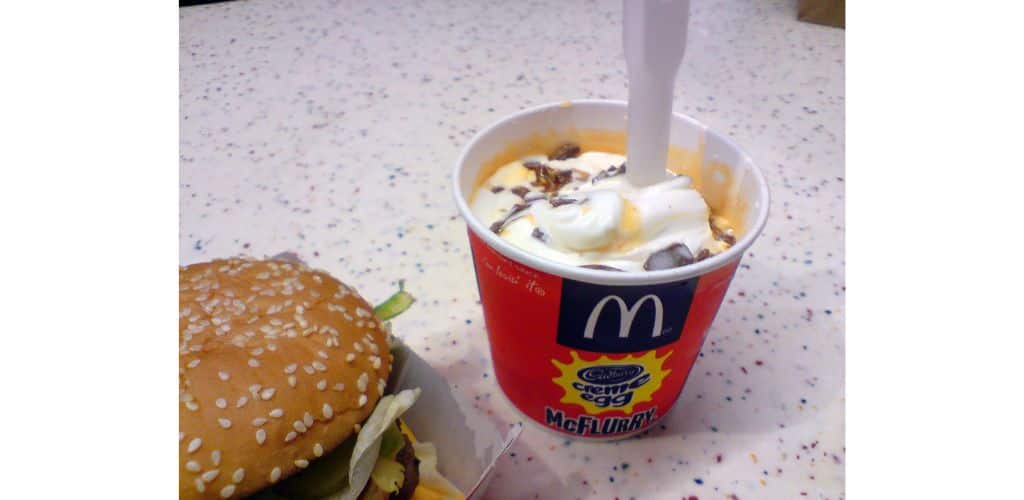The US Copyright Office has granted a copyright exemption giving restaurants the right to repair broken equipment by bypassing locks intended to prevent anyone other than the manufacturer from repairing them.
This seemingly technical rule has attracted media attention because it affects McDonalds ice cream machines – the source of McFlurries.
As the Foundation for Economic Education (FEE) explains,
Social media was in a flurry after President Trump recently spent a day working at a McDonald’s branch. The stunt was decent PR for the president and was accompanied by a fair share of memes—including one from Trump himself.
WHEN I’M PRESIDENT THE MCDONALD’S ICE CREAM MACHINES WILL WORK GREAT AGAIN! pic.twitter.com/jqdyMpgnLF
— Donald J. Trump (@realDonaldTrump) October 27, 2024
Trump’s joke here plays off a widespread experience McDonald’s customers have. Oftentimes, when you order a McFlurry at McDonald’s you’re met with a disappointing response: “Our ice cream machine is broken.”
How could it be that the ice cream machines at McDonald’s are so consistently broken? It turns out that, until just recently, it was illegal to hire most people to fix them.
As the US Copyright Office explains,
The Digital Millennium Copyright Act (“DMCA”), codified in part in 17 U.S.C. § 1201, makes it unlawful to circumvent technological measures used to prevent unauthorized access to copyrighted works, including copyrighted books, movies, video games, and computer software.
17 U.S. Code § 1201 states that “No person shall circumvent a technological measure that effectively controls access to a work protected under this title.”
According to the New York Times,
When a McDonald’s ice cream machine breaks down, simple fixes are often stymied by digital locks installed on the machines by the manufacturer, Taylor Company, according to iFixit, an online repair guide that helped petition for the exemption. A provision in the Digital Millennium Copyright Act made it illegal for a third party — like a franchiser or a McDonald’s employee — to bypass a digital lock. Repairs must be done by a manufacturer-authorized technician, iFixit said.
The new exemption gives McDonald’s and other restaurants broader rights to repair “retail-level commercial food preparation equipment” without having to go through the manufacturer.
However, as Elizabeth Chamberlain of iFixit points out,
While it’s now legal to circumvent the digital locks on these machines, the ruling does not allow us to share or distribute the tools necessary to do so. This is a major limitation … few will be able to walk through it without significant difficulty.
It is still a crime for iFixit to sell a tool to fix ice cream machines, and that’s a real shame … Without these tools, this exemption is largely theoretical for many small businesses that don’t have in-house repair experts.
This is because the DMCA also prohibits trafficking in devices or tools that can help others circumvent access-control and copy-control measures designed to prevent access to copyrighted material.
Under 17 U.S.C. § 1201(a)(2), (b),
No person shall manufacture, import, offer to the public, provide, or otherwise traffic in any technology, product, service, device, component, or part thereof, that— … has only limited commercially significant purpose or use other than to circumvent a technological measure that effectively controls access to a work protected under this title….
“Trafficking” can include simply posting something on a website.
For example, as Cornel Law School’s Legal Information Institute relates,
…in 1999 a Norwegian teenager created a software program called “DeCSS” that allowed users to circumvent CSS, the encryption technology used by movie studios to stop unlicensed playing and copying of commercially distributed DVDs. A number of websites posted the source and object code for DeCSS on the Internet, and other websites linked to them. The Second Circuit held that hosting and linking to the DeCSS code violated the DMCA’s anti-trafficking provisions, and that this application of the DMCA did not violate the First Amendment. See Universal City Studios, Inc. v. Corley, 273 F.3d 429 (2d Cir. 2001).
As the FEE explains,
Several states such as Massachusetts, Minnesota, California, Oregon, and Colorado have passed laws under the banner of “right to repair,” though these laws range from disclosures of repair techniques to banning certain bundling practices, and none of them are able to undermine the DMCA more broadly.
Just like the haiku above, we like to keep our posts short and sweet. Hopefully, you found this bite-sized information helpful. If you would like more information, please do not hesitate to contact us here.


